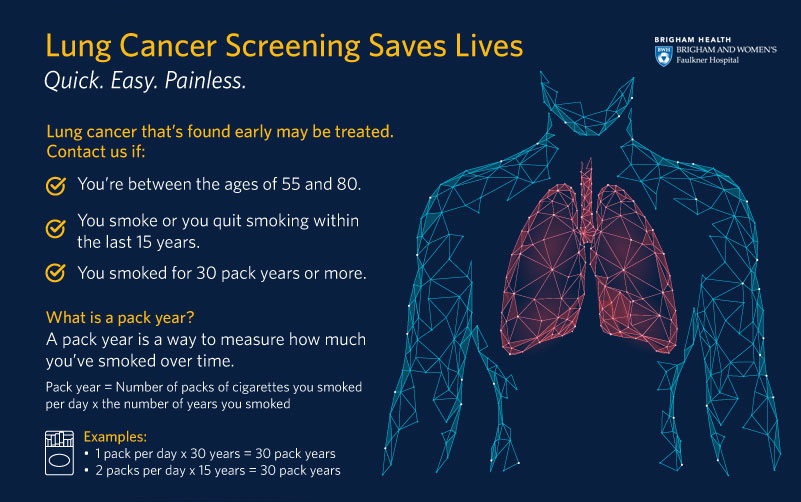Throughout November, we’re recognizing National Lung Cancer Awareness Month by encouraging tobacco smokers to select a quit date and to get screened.
Lung cancer is the leading cancer killer of women and men in the U.S. and in large part is caused by smoking. One reason why lung cancer is so deadly is because by the time you have symptoms, it may already have spread and become more difficult to treat. Even during these unprecedented times it’s particularly important to avoid delaying care.
Successfully quitting tobacco requires a plan and support. Some options include using nicotine replacement therapy, using self-help books, or joining a cessation class like Brigham Health Smoking Cessation Program. Selecting a quit day is the first step to quitting for good.
The National Lung Screening Trial found that these scans offered a 20 percent decrease in lung cancer specific mortality. Together we can prevent lung cancer deaths and demonstrate our further commitment to improving patient health beyond lung cancer.
The United States Preventative Services Task Force recommends annual lung cancer screening CT scans for smokers and former smokers who have smoked within the preceding 15 years who are between the ages of 55-80 years who have smoked 20 cigarettes every day for 30 years. The requirement of shared decision making for enrollment can be fulfilled by the ordering physician or by ambulatory consultation request to The Lung Center. The CT scan is performed in less than one minute, without contrast or changing into a hospital gown. For high risk individuals lung cancer screening is usually covered by Medicare and by most healthcare plans, including AllWays Health Partners.
The United States Preventative Service Task Force released a draft recommendation in mid-July that would expand criteria to include those between the ages of 50-80 years who have smoked 20 cigarettes every day for 20 years. The changes in the new draft recommendations will greatly increase the number of those eligible for screening so spread the word to your family, friends, and neighbors.
The National Lung Screening Trial found that these scans offered a 20 percent decrease in lung cancer specific mortality. Together we can prevent lung cancer deaths and demonstrate our further commitment to improving patient health beyond lung cancer.
If you have questions about eligibility, or you would like to refer a patient, contact Sabrina Klein Project Manager, at 617-983-4586 or BWFHLCS@Partners.org.

Looking for more news from BWFH? Go to News to find articles about health, updates to our programs and services and stories about staff and patients.
Go to News